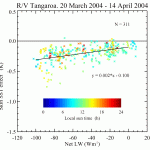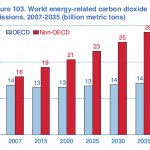climate change
The natural world is complicated. Therefore, so is the science that tries to understand it.
Complexity, uncertainty, ambiguity are all a part of the story that describes processes that are as extraordinary as they are mundane. While these are the very characteristics of scientific study that motivate professional and amateur alike, they are also the characteristics that give delayers, doubters and liars in the climate debates ample material for confusing and misrepresenting reality.
One such complexity is the interaction of infra-red or long wave radiation (IR or LW), the ocean surface…
Debating the merits and dangers of fracking shale gas has become a major obession of those who worry about energy and the climate. Yale's e360's latest contribution comes in the form a forum that includes a wide variety of perspectives pro and con.
For me, the wisest observation, and the one that really trumps all others, comes from Kevin Anderson, who directs the Tyndall Centre for Climate Change Research's energy program:
... the only responsible action with regard to shale gas, or any "new" unconventional fossil fuel, is to keep it in the ground -- at least until there is a meaningful…
Logging the Onset of The Bottleneck Years
This weekly posting is brought to you courtesy of H. E. Taylor. Happy reading, I hope you enjoy this week's Global Warming news roundup
skip to bottom Another week of Climate Disruption News Logging the Onset of The Bottleneck YearsJune 19, 2011 Chuckles, Bonn, The Conversation, Forest Europe, Solar Cycle, SRREN, Threats Bottom Line, Subsidies, C40, Psyche, Cook, Equinox Fukushima Note, Fukushima News, Nuclear Policy, Fukushima Talk Melting Arctic, Geopolitics, Antarctica Food Crisis, Agro-Corps, Food Prices, Food vs. Biofuel,…
Overseeing the U.S. Geological Survey (USGS) - the country's largest water, earth and biological scientific and civilian mapping agency -- seems a natural fit for Marcia McNutt. She's a Navy Seals-trained underwater demolition and explosives expert, earthquake scientist, avid lover of the ocean -- and a leading geophysicist who brings vast academic and scientific background to her post.
As the first woman director of the USGS in the agency's 131-year history, Marcia was nominated to the post by President Obama in 2009 and later approved by the Senate to head USGS's mission of serving as…
The title of this post won't mean much until you read this contribution to The Conversation, a new and laudable attempt by climatologists to get out the message that time's a wastin,' folks. Here's a taste:
We're only a few decades away from a major tipping point, plus or minus only about a decade. The rate at which the ice sheets would melt is fairly uncertain, but not the result that says we are very close to a tipping point committing to such melt and breakdown.
...
Is it irresponsible or "alarmist" of climatologists to point this out? The science brief for policy is not to prescribe…
Logging the Onset of The Bottleneck Years
This weekly posting is brought to you courtesy of H. E. Taylor. Happy reading, I hope you enjoy this week's Global Warming news roundup
skip to bottom Another week of Climate Disruption News Information is not Knowledge...Knowledge is notWisdomJune 12, 2011 Chuckles, Bonn, Fukushima News, Nuclear Policy, Fukushima Talk Equinox Summit, C40, Threats, SRoWE, GFI, Thermodynamics, Cook Melting Arctic, Geopolitics Food Crisis, Agro-Corps, Food Prices, Hunger, Land Grabs, GMOs, Food Production Hurricanes, GHGs, Carbon Cycle,…
This video, a selection of TV news clips that serve to illustrate Bill McKibben's recent op-ed on climate change denial, has already made the rounds, but as it deserves as wide an audience as possible, I'll do my bit.
It's also noteworthy because the op-ed marked a first for McKibben: the use of a snarky, satirical tone. Until now, he's been a upbeat cheerleader for climate change activists. Sooner or later, it would, we all get tired of banging our head against a wall and have to lash out at idiocy.
The flaws with Wednesday's anti-renewables op-ed in the New York Times begin with the headline and continue through just about every paragraph. On second thought, perhaps the problems begin with the decision of the New York Times to run "The Gas Is Greener" in the first place. But let's start with the headline.
"The Gas is Greener" may seem like a clever double entendre, referring as it does to wishful thinking and the alleged merits of natural gas as a relatively clean source of energy. But it fails on both counts. First, the entire essay is predicated on the notion that environmentalists…
Richard Glover has a very funny - and in many ways on-target analysis here.
Don't get me wrong - as I've said many times before, I know a lot of people who don't take climate change seriously, but who also recognize for various other reasons that we can't burn fossil fuels the way we are. I believe in the big tent. But there is something to be said for even metaphorically making people take ownership of their politics - and the implications of their politics.
I realize someone is going to be outraged by this - ah well, can't please everyone! I find it funny, not because I want to…
Logging the Onset of The Bottleneck Years
This weekly posting is brought to you courtesy of H. E. Taylor. Happy reading, I hope you enjoy this week's Global Warming news roundup
skip to bottom Another week of Climate Disruption News Information Overloadis Pattern RecognitionJune 5, 2011 Chuckles, COP17+, Fukushima News, Nuclear Policy, Fukushima Talk C40, Death Threats, Cate Debate, FOI Weapon, Thermodynamics, Cook Melting Arctic, Penguins, Geopolitics, Antarctica Food Crisis, Agro-Corps, Food Prices, CCAFS, Land Grabs, GMOs, Food Production Hurricanes, Monsoon, GHGs,…
"I agree. This is real science. But I have no idea what it means."
There is a reason science is not a democracy.
If you don't (understandably) want to wade through that whole "analysis", here is the crux of the (surprise, surprise!) conclusion that climate sensitivity to CO2 is almost nothing:
If we accept the IPCC/AGW paradigm and grant the climatological purity of the early 20th century, then the natural recovery rate from the LIA averages about 0.05 C/decade. To proceed, we have to assume that the natural rate of 0.05 C/decade was fated to remain unchanged for the entire 130 years, through…
Logging the Onset of The Bottleneck Years
This weekly posting is brought to you courtesy of H. E. Taylor. Happy reading, I hope you enjoy this week's Global Warming news roundup
skip to bottom Another week of Climate Disruption News Sipping from the Internet Firehose...May 29, 2011 Chuckles, Songda & Fukushima, Fukushima News, Nuclear Policy, Fukushima Talk The Question, Attribution, G8, Critical Decade, FOI Harassment Bottom Line, GFI, Norway, Thermodynamics, Psyche, Cook Melting Arctic, Reindeer, Geopolitics, Antarctica Food Crisis, Food Prices, Food vs. Biofuel,…
David Appell at Quark Soup draws our attention (via Stoat) to a graph in the recent America's Climate Choices report from the NAS/NRC. If the forecasts on which the authors rely come to pass, it's going to take almost a couple of decades for U.S. energy-related CO2 emissions to return to post-recession levels. Sounds like good news.
Two years ago, Lester Brown at the Earth Policy Institute wrote of a watershed moment, and while it looks like he was a bit too enthusiastic -- long-term, carbon emissions still rise -- he might have been on to something.
The United States has ended a century of…
Logging the Onset of The Bottleneck Years
This weekly posting is brought to you courtesy of H. E. Taylor. Happy reading, I hope you enjoy this week's Global Warming news roundup
skip to bottom Another week of Climate Disruption News Logging the Onset of The Bottleneck YearsMay 22, 2011 Chuckles, IDB, Fukushima News, Nuclear Policy, Fukushima Talk, Socolow, Flooding Slave Lake, UK Carbon Plan, Stockholm Memorandum, Bottom Line, Prelude, Cook Melting Arctic, Geopolitics, Antarctica Food Crisis, Agro-Corps, Food Prices, Food vs. Biofuel, GMOs, Food Production Hurricanes,…
A long time ago in a galaxy far far away, I was a 21-year-old journalism student spending a couple of weeks as an intern at Science Dimension, a government-funded magazine (there weren't any private science magazines in the country). I was assigned two short features while there: one on canola bioengineering and another on Canada's asbestos industry. Both amounted to free publicity for industries heavily supported by the Canadian taxpayer, but I think the canola story withstood professional scrutiny. The asbestos piece? Not so much.
That story continues to haunt me. The only good thing I can…
By Kim Krisberg
Climate change is one of the greatest challenges of our time. Climate change will affect, in profoundly adverse ways, some of the most fundamental determinants of health: food, air, water. In the face of this challenge, we need champions throughout the world who will work to put protecting human health at the centre of the climate change agenda.
-- Margaret Chan, MD, MPH, director-general, World Health Organization, 2008
Human health may not be the first image that pops to mind when it comes to climate change. People often envision melting icebergs or desperate polar bears…
Logging the Onset of The Bottleneck Years
This weekly posting is brought to you courtesy of H. E. Taylor. Happy reading, I hope you enjoy this week's Global Warming news roundup
skip to bottom Another week of Climate Instability News Information is not Knowledge...Knowledge is notWisdomMay 15, 2011 Chuckles, COP17+, Fukushima News, Nuclear Policy, Fukushima Talk, Flooding Arctic Council, SRREN, Wikileaks, UNGCF, Fossils vs Biofuels, Thermodynamics, Cook Melting Arctic, Geopolitics, Antarctica Food Crisis, Food Prices, Land Grabs, Food Production Hurricanes, Temperatures,…
Whenever I talk about going to lower energy usage, a percentage of people shout out something like "But that would mean going back tothe stone age, to lepers walking the streets and people throwing their feces out the window on our heads!!!" I think it is fair to say that variations on the "without power, life would be intolerable" is a common assumption.
Part of the thing that bothers me about it is that I don't think it is true. I've spent a lot of time studying history, and I don't think the lives of all of those in human history who preceeded us were intolerable. I am extraordinarily…
Forced climate change causes global warming as a response, not the other way around.
We all focus on globally and seasonally averaged mean temperature, and though it is a very coarse measure, there are some justifiable reasons. But as a general focus for those concerned about the human influence on our planetary life support system, is it right?
Michael Tobis has a great essay on why it really isn't. If the sentence above doesn't quite get the point across, from the same paragraph:
It takes a hell of a kick to move global temperature as much as we are moving it, and the climate system is…


